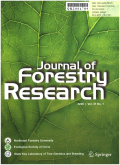- 钛学术文献服务平台 \
- 学术期刊 \
- 农业科学期刊 \
- 林业期刊 \
- 林业研究(英文版)期刊 \
Metabolic diversity and seasonal variation of soil microbial communities in natural forested wetlands
Metabolic diversity and seasonal variation of soil microbial communities in natural forested wetlands
基本信息来源于合作网站,原文需代理用户跳转至来源网站获取
摘要:
This study explores the effects of vegetation and season on soil microorganisms and enzymatic activity of different wetlands in a temperate climate.Microbial carbon metabolism diversity was assessed using community-level physiological profiles(CLPP)with 31 different carbon sub-strates.CLPP indicated that significant interactions occur during carbon substrate metabolism of the microorganisms.Furthermore,the different types of vegetation present in the wetland ecosystem combined with the seasonal effects to influence microbial carbon metabolism and enzymatic activity.The most significant differences occurred to car-bohydrates,carboxylic acids,and amino acids.The Mantel test confirmed positive correlations between soil enzymatic activities and microbial carbon metabolism.Soil microor-ganisms in Betula ovalifolia and Carex schmidtii wetlands used carbon substrates more efficiently in summer than those in other forested wetlands during other periods.Enzymatic activities also showed a similar trend as microbial carbon metabolism.The results demonstrate that microbial carbon metabolism patterns can be used as biological indicators in wetland ecological alterations due to vegetation type or to seasonal factors.

推荐文章
Microaerobic iron oxidation and carbon assimilation and associated microbial community in paddy soil
Paddy soil
Microaerobic Fe(Ⅱ)-oxidation
CO2 assimilation
SIP
Hyperspectral estimation model of soil Pb content and its applicability in different soil types
Hyperspectral data
Heavy metal
Pb
Estimation
Influence of litter decomposition on iron and manganese in the sediments of wetlands for acid mine d
AMD
Sediments
Litter decomposition
Forms of Fe and Mn
Seasonal shifts in the solute ion ratios of vadose zone rock moisture from the Eel River Critical Zo
Vadose zone
Solute ion ratios
Critical Zone Observatory
Seasonal solute dynamics
内容分析
关键词云
关键词热度
相关文献总数
(/次)
(/年)
引文网络
引文网络
二级参考文献 (0)
共引文献 (0)
参考文献 (0)
节点文献
引证文献 (0)
同被引文献 (0)
二级引证文献 (0)
2021(0)
- 参考文献(0)
- 二级参考文献(0)
- 引证文献(0)
- 二级引证文献(0)
引文网络交叉学科
相关学者/机构
期刊影响力
林业研究(英文版)
主办单位:
东北林业大学
中国生态学学会
出版周期:
双月刊
ISSN:
1007-662X
CN:
23-1409/S
开本:
大16开
出版地:
哈尔滨市动力区和兴路26号(林大123信箱)
邮发代号:
创刊时间:
1990
语种:
eng
出版文献量(篇)
2459
总下载数(次)
1
总被引数(次)
7852
期刊文献
相关文献
推荐文献
- 期刊分类
- 期刊(年)
- 期刊(期)
- 期刊推荐
林业研究(英文版)2022
林业研究(英文版)2021
林业研究(英文版)2020
林业研究(英文版)2019
林业研究(英文版)2018
林业研究(英文版)2017
林业研究(英文版)2016
林业研究(英文版)2015
林业研究(英文版)2014
林业研究(英文版)2013
林业研究(英文版)2012
林业研究(英文版)2011
林业研究(英文版)2010
林业研究(英文版)2009
林业研究(英文版)2008
林业研究(英文版)2007
林业研究(英文版)2006
林业研究(英文版)2005
林业研究(英文版)2004
林业研究(英文版)2003
林业研究(英文版)2002
林业研究(英文版)2001
林业研究(英文版)2000
林业研究(英文版)1999

 免费查重
免费查重










